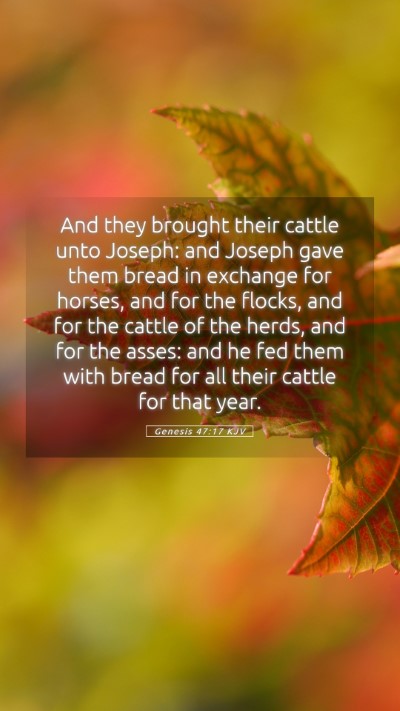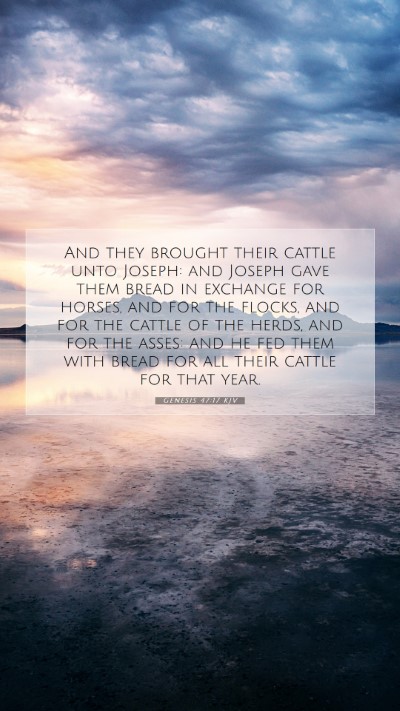Bible Verse Commentary on Genesis 47:17
Verse: "And they brought their cattle unto Joseph: and Joseph gave them bread in exchange for horses, and for the flocks, and for the cattle of the herds, and for the asses: and he fed them with bread for all their cattle for that year."
Introduction
This verse from Genesis 47:17 focuses on a significant event during a time of famine in Egypt, where Joseph, now a high-ranking official, plays a pivotal role in providing for the people. The verse highlights the pragmatic solutions during a national crisis, illustrating Joseph's wisdom and the necessity of resource management. In understanding this verse, we can glean insights about God's provision, human need, and the operation of divine plans through human actions.
Insights from Public Domain Commentaries
Matthew Henry’s Commentary
Matthew Henry emphasizes Joseph's administrative skill in managing resources wisely during the famine. He stresses that the act of exchanging cattle for bread wasn't just a transaction but also illustrated a greater spiritual truth about dependence on God. Joseph's wise leadership ensured that both immediate needs and long-term survival were addressed, depicting God's providence in times of crisis. Joseph’s benevolence symbolizes how godly leaders should take care of their people amidst adversity.
Albert Barnes’ Notes
Albert Barnes points out the significance of Joseph's actions for the Israelites in Egypt. He details that Joseph provided food in exchange for livestock, which reflects the desperation of the people and the extreme measures they had to take to survive. Barnes further mentions that this transactional approach ensures that the government retains control over food supplies while meeting the needs of the populace. This highlights the importance of structured systems in managing resources during a crisis and warns against the potential for governmental overreach.
Adam Clarke’s Commentary
Adam Clarke provides an extensive analysis of the economic implications of this transaction. He discusses the larger context of how the Israelites, later on, would find themselves in servitude as a result of these exchanges. Clarke interprets this relationship in light of God's plan for the Israelites, foreshadowing their later exodus and the fulfillment of His promises. He draws attention to the moral dimensions of the situation, emphasizing the need for discernment in trading one's freedom for sustenance.
Theological Implications
This passage illustrates several theological themes and lessons:
- Divine Providence: God's provision is evident in Joseph's management of resources during the famine, showcasing that He cares for His people in difficult circumstances.
- Human Dependency: The people’s need for sustenance reveals the human condition of dependence on God and others for provision, particularly in times of crisis.
- Wisdom in Leadership: Joseph's ability to anticipate and manage the crisis reflects the qualities necessary for effective leadership that trusts in God and acts with wisdom.
- Moral Lessons: The narrative serves as a cautionary tale about the potential compromises one might make when facing desperation, especially regarding freedom and choices.
Cross References
This verse connects with several other biblical passages:
- Genesis 41:30-31 - Joseph interprets Pharaoh’s dreams about the coming famine.
- Genesis 45:10 - Joseph speaks to his brothers about their future sustenance in Egypt.
- Exodus 1:12 - Discusses the increasing numbers of Israelites in Egypt over time.
Application for Today
The narrative of Genesis 47:17 can be applied to modern life in various ways, such as:
- Resource Management: In times of scarcity, we are encouraged to manage our resources wisely, reflecting Joseph's strategic approach.
- Community Support: The importance of looking out for one another during crises, mirroring Joseph's actions toward the people of Egypt.
- Understanding Difficult Situations: Recognizing that tough decisions sometimes involve sacrifices, yet they can lead to greater good if aligned with God's will.
Conclusion
In summary, Genesis 47:17 serves not only as a historical account of Joseph’s stewardship during a famine but also as a rich source for biblical exegesis and understanding Scripture. It encourages us to delve into scripture analysis and explore Bible verse interpretations, revealing profound insights about God’s provision, human dependence, and ethical considerations in times of trouble.


